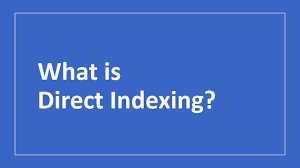Direct Indexing
Aug 11, 2021

“Indexing” is a familiar phrase in investment jargon, and a familiar concept. Money managers structure certain investment vehicles to contain all of the stocks within a particular Wall Street index, such as the Standard & Poor’s 500 stock index. This equity exposure may fit the investment strategy for some investors depending on their risk tolerance, time horizon and goals.
“Direct indexing” is a variation on this idea.
The goals are the same: to match the performance of an index. The methodology differs, however. Instead of buying one investment designed to mirror the composition of an index, the investor buys shares of each stock within the index.
Why would an investor go to such lengths?
To start, the pursuit of tax efficiency. Direct indexing can also lead to a more customized portfolio, giving an investor more ability to add and subtract companies that do or do not align with that investor’s values or market objectives.1
This article is for informational purposes only.
It’s not a replacement for real-life advice, so make sure to consult your tax or accounting professionals before modifying your tax strategy if you are considering direct indexing.
Technological advances have put direct indexing within reach of more investors today. Years ago, it was largely the domain of hands-on types with considerable assets in their portfolios. Now, there are firms that can help with this approach.
Direct indexing can encourage more trades.
A hands-on investor closely scrutinizing performance may want to consider a direct indexing strategy, especially when the equities market turns turbulent. But that can lead to more fees, which may offset the potential benefits of the approach.2
This article is strictly an explanation of the basics of direct indexing, and not an endorsement or recommendation of the strategy. If direct indexing interests you, feel free to explore the approach by consulting a professional before attempting it.
For more insights and resources, be sure to sign up for our Weekly Market Commentary. Follow our YouTube channel where we regularly post our Epic Market Minute videos. Follow us on LinkedIn, or like us on Facebook. And as always, please don’t hesitate to reach out to a dedicated service professional at Epic Capital.
Investing involves risk, including the potential loss of principal. No investment strategy can guarantee a profit or protect against loss in periods of declining values. The S&P 500 Composite Index is an unmanaged index that is considered representative of the overall U.S. stock market. Opinions expressed are subject to change without notice and are not intended as investment advice or to predict future performance. Past performance does not guarantee future results. Consult your financial professional before making any investment decision. This information is designed to provide general information on the subjects covered. It is not, however, intended to provide specific legal or tax advice and cannot be used to avoid tax penalties or to promote, market, or recommend any tax plan or arrangement.
Tags: financial advisor charlotte nc, Investing, Investment Planning, Investment Portfolio, Investments, Personal Finance
More Insights
At some point in our lives, we may inherit a home or another form of real property. In such instances, we need to understand some of the jargon involving inherited real estate. What does “cost basis” mean? What is a “step-up?” What is the home sale tax exclusion, and what kind of tax break does … Continue reading “Explaining the Basis of Inherited Real Estate”
Medicare won’t cover all of your health-care costs during retirement, so you may want to buy a supplemental medical insurance policy known as Medigap. Offered by private insurance companies, Medigap policies are designed to cover costs not paid by Original Medicare (Parts A and B), helping you fill the gaps in your Medicare coverage. You’ll … Continue reading “Buying Supplemental Health Insurance: Medigap”
Incapacity can strike anyone at any time. Estate Planning plans for it By definition, estate planning is a process designed to help you manage and preserve your assets while you are alive, and to conserve and control their distribution after your death according to your goals and objectives. But what estate planning means to you … Continue reading “Estate Planning Intro”
You’re beginning to accumulate substantial wealth, but you worry about protecting it from future potential creditors. Whether your concern is for your personal assets or your business, various tools exist to keep your property safe from tax collectors, accident victims, health-care providers, credit card issuers, business creditors, and creditors of others. To insulate your property … Continue reading “Estate Planning – Protecting Your Assets”
It seems like we just can’t stop talking about the Federal Reserve (Fed). After an aggressive rate hiking campaign that we think ended last year, markets were expecting the Fed to start cutting interest rates as early as next month. But withan economy that continues to surprise to the upside, along with inflationary pressures that … Continue reading “Market Update – The Patient Pause”
Services
Epic Capital provides the following comprehensive financial planning and investment management services: Learn More >


 Top of Page
Top of Page











